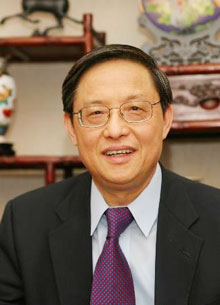|
Hu's visit to further constructive Sino-US ties
(Xinhua)
Updated: 2006-04-14 13:36
WASHINGTON -- Chinese President Hu Jintao's upcoming visit to the United
States will successfully expand bilateral exchanges and cooperation while
furthering constructive and cooperative relations, Chinese Ambassador to the
United States Zhou Wenzhong said on Thursday.

Zhou Wenzhong, Chinese
ambassador to the the United States.
[Xinhua] | Hu's first state visit to the United
States scheduled for April 18-21 will be another major event for China-U.S. ties
after presidents of the two countries met in New York and Beijing last year,
Zhou said in an interview with Xinhua.
Both the Chinese and U.S. sides
have consulted heavily and prepared meticulously for the visit, which is aimed
at expanding consensus and cooperation to jointly promote constructive and
cooperative relations, he said.
The relationship between China, the
world's largest developing country, and the United States, the largest developed
country, is undoubtedly among the most important bilateral relations in the
world, and both nations share responsibilities in maintaining peace, security
and prosperity in the world, particularly the Asia-Pacific region, Zhou said.
Although they have different views on certain issues due to their
different social systems, economic development levels and cultural backgrounds,
China and the United States share broad and important common interests. That is
why they should and could foster steady development of long-term constructive
and cooperative relations, Zhou said.
Underscoring the achievements in
bilateral ties since China and the United States established diplomatic
relations 27 years ago, the ambassador said that in today's new era of global
peace, development and cooperation, both nations had more common interests and
the foundation for their cooperation had been strengthened rather than weakened.
Hence, the importance of China-U.S. relations has become more prominent than
ever, he said.
Zhou said the general trend of present bilateral relations
was steady and sound.
The two sides have frequent high-level communications
and contacts, increasing dialog and exchanges at various levels and in many
areas, he said.
They are also expanding cooperation in trade,
anti-terrorism, law enforcement, nonproliferation, infectious disease control,
science and technology, education and other areas. And positions are coordinated
in international and regional affairs such as the nuclear issue on the Korean
Peninsula, the Iranian nuclear issue, the reconstruction of Iraq and United
Nations affairs, according to Zhou.
China hopes to work more closely
with the United States to promote peace, stability and prosperity in the
Asia-Pacific region and the world as a whole, he said.
On economic issues,
Zhou said China-U.S. trade relations were mutually beneficial and had yielded
concrete benefits for the two peoples.
Acknowledging that there will be some
friction as bilateral trade grows rapidly, he said the key to solving such
problems would be sticking to the principles of "equality, mutual benefit and
development," and the avoidance of politicization of economic and trade issues.
The outcome of the recent meeting of the Sino-U.S. Joint Commission on
Commerce and Trade in Washington is positive and will help ease trade friction,
Zhou said.
As the most important and sensitive issue in China-U.S.
relations, the Taiwan issue is crucial to maintaining steady development of
bilateral relations, he said.
Zhou said it was in the interests of both
China and the United States to oppose and contain "Taiwan independence," and to
maintain peace and stability across the Taiwan Straits and in the Asia-Pacific
region.
He said the Chinese side hoped the U.S. government would stick
to its pledges on the issue and handle the Taiwan issue in a proper manner.
Zhou said bilateral military ties were also an important part of
China-U.S. relations and the general trend of military-to-military relations had
been good in recent years.
Increased exchanges between the two
militaries have helped enhance mutual understanding and trust, and China is
willing to work closely with the United States to further develop the bilateral
military relations, he said.
The ambassador said it had already been
proven and will be further proven in the future that China's development was
peaceful, open, cooperative and harmonious.
China's peaceful development
will only provide new and important opportunities for both countries, their
peoples and the rest of the world, and would never pose a threat to the United
States or any other nation, he said.
In all, there will be even greater
prospects for China and the United States to further their relations in the new
century, Zhou added.
|
| |
|
| |
|